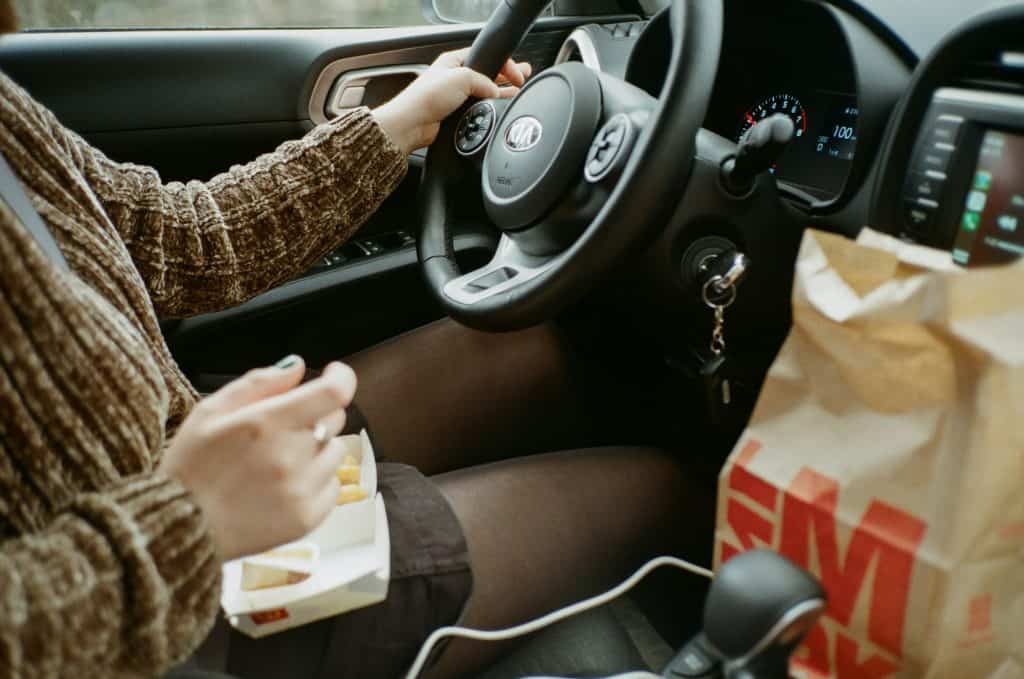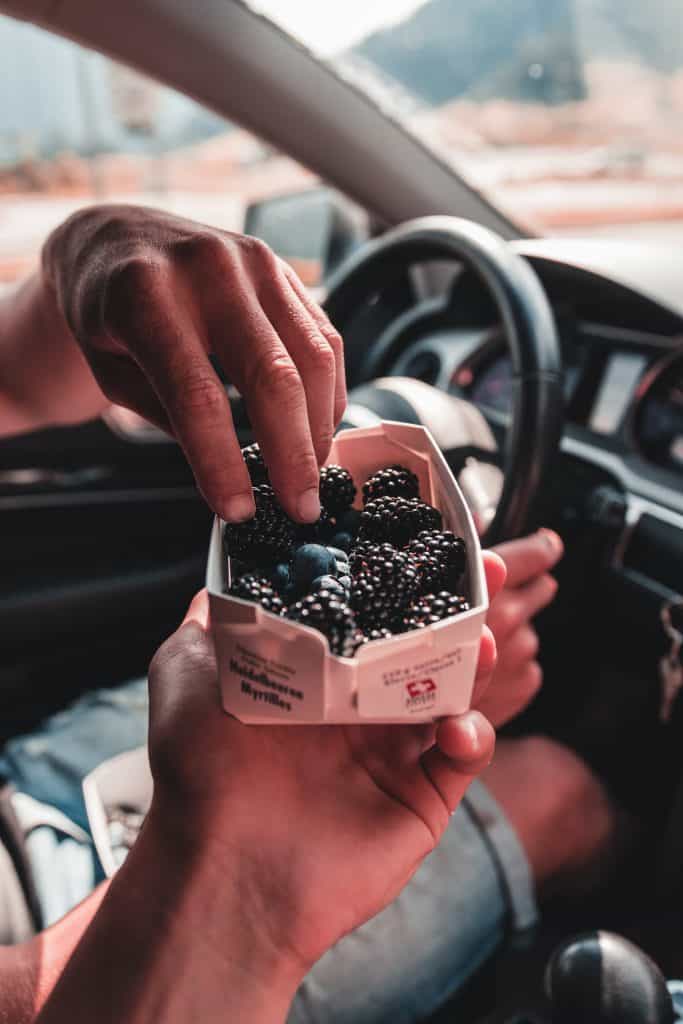Table of Contents

- Photo by Daria Sannikova from Pexels
We’ve probably all done it. Driving down the motorway with one hand shovelling some sort of pastry into your mouth—leaving a dusting of crumbs all over the place—the other hand on the wheel. You were in a rush, devoid of the good breakfast your body craves as you flew out the door in a rush to get wherever you needed to be. So, can you eat and drive? Is it illegal to eat and drive? Are there rules on munching and motoring? Let’s find out.
Is it illegal to eat and drive?
Eating and driving on its own isn’t specifically illegal, but there’s more nuance to it than that. In several countries, eating and driving under certain circumstances can result in being charged with a criminal offence. Eating while operating a motor vehicle may form part of the factual element of other motoring offences. I remember watching Jeremy Clarkson in an old episode of Top Gear in one of his usual rants about the overregulation of driving by the government and how “you can’t change radio stations because that is a motoring offence”—or something to that tune. By the way, it’s also not true (in the UK at least).
Instead, eating and driving may be illegal if it causes you to commit some other motoring offence while doing it, such as careless driving. People tend to forget that the vehicle they’re driving is a weapon that should be treated as such. Here, we’ll talk about careless driving and dangerous driving, or related laws in a few jurisdictions, and give you one ridiculous example of how far outside the law some people have gone while eating and driving.
Careless driving laws
The most common motoring offence that ties into eating and driving are careless driving or reckless driving offences. It’s different for each country but the concept behind the laws are the same, and the laws in this area are intentionally broad. This means doing anything—texting, talking on the phone, urinating in a bottle because you missed the last service station—while operating a vehicle can be illegal if it causes you to become inattentive to driving or causes an accident because you were not exercising the due care and attention that is required under the law.
Let’s take one example of careless driving in Canada. In the most stereotypical Canadian fashion, a driver was pulled over after a police officer saw him eating poutine—the most Canadian dish known to humankind—with both hands. Using a fork and a bowl. In rush hour traffic. With two kids in the back. Although there’s generally not a problem with eating when driving, it immediately becomes an issue when it means that you are not able to put your hands on the steering wheel. This will likely result in an offence like careless driving.
Careless driving is highly contextual: if the driver had one hand on the wheel at low speed with a sandwich in the other, it might not have been a problem. Vice versa, if you’re flying down the motorway at 80 miles an hour trying to eat a huge slice of pizza, the police might consider that careless.
Here are some careless driving laws for other countries that exclude driving under the influence offences or accidents where someone has been killed:
Hong Kong
If a person drives carelessly if on a road he drives a vehicle without due care and attention or without reasonable consideration for other persons using the road, that person is guilty of an offence (Section 38(2) of the Road Traffic Ordinance (Cap.374))
Maximum fine of $5,000 and up to 6 months imprisonment.

Singapore
If any person drives a motor vehicle on a road recklessly, or at a speed or in a manner which is dangerous to the public, having regard to all the circumstances of the case, the person shall be guilty of an offence (Section 64, Road Traffic Act).
A fine not exceeding $5,000 or imprisonment for a term not exceeding 12 months, or to both.
United Kingdom
If a person drives a mechanically propelled vehicle on a road or other public place without due care and attention, or without reasonable consideration for other persons using the road or place, he is guilty of an offence (Section 3, Road Traffic Act 1988).
A fine of up to £5,000, 3-9 penalty points, a disqualification from driving.
Australia
Differs by states and territories but laws are very similar to the UK and Hong Kong.
New Zealand
A person commits an offence if the person operates a vehicle on a road carelessly or without reasonable consideration for other persons using the road (Section 37(1) Land Transport Act 1998)
A maximum penalty is a fine not exceeding $3,000; and the court may order the person to be disqualified from holding or obtaining a driver licence for such period as the court thinks fit
It’s worthy to note that a lot of countries have a separate offence of using your phone while driving owing to a global push to reduce road deaths in the 2000s due to handheld phones.
And never drink and drive. No, a little is not okay. A recent study found that accident severity increases significantly even when the driver is merely “buzzed”, i.e. below the legal limit but still with alcohol in their system, when compared to sober drivers. These drivers are also significantly more likely to speed, be improperly seat-belted and to be driving the vehicle at fault if an accident occurs. Be responsible.
This article does not constitute legal advice.
The opinions expressed in the column above represent the author’s own.
Start managing your legal needs with Zegal today
READ MORE: COVID-19 Small Business Scams You Need to Know About
Hailey Cheung
Hailey Cheung is a PCLL candidate at City University of Hong Kong with a Bachelor of Laws (LLB) from the University of Bristol. She has extensive legal experience, including roles as a Dispute Resolution Paralegal at Harneys, Student Advisor at the University of Bristol Law Clinic, and internships at Mayer Brown, Stephenson Harwood, and Zegal. A recipient of the Dean’s List International Scholar Award, Hailey also holds a Business Foundations Specialization from Wharton Online. She is passionate about legal advocacy and international trade.






